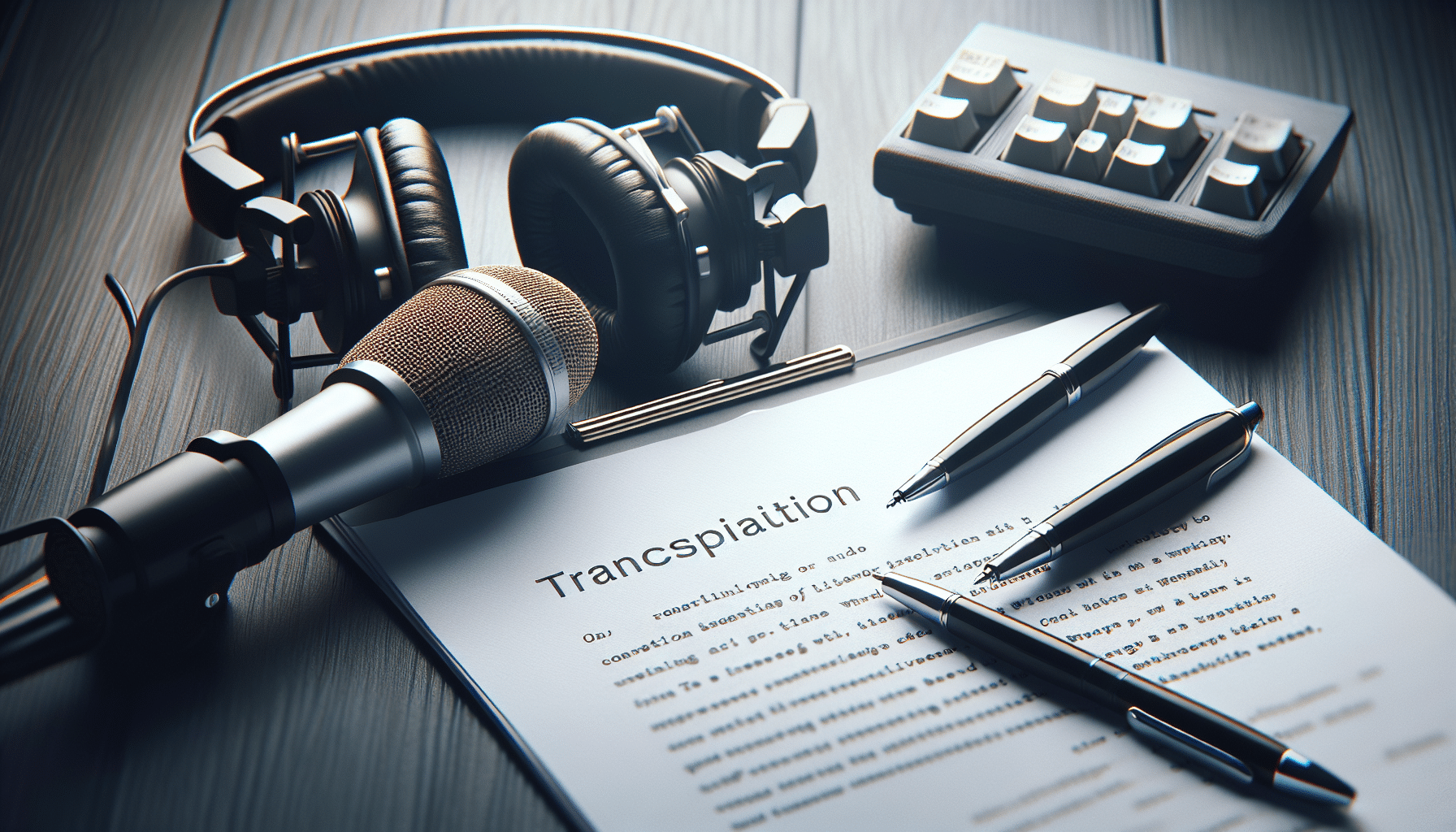Are you interested in a flexible and rewarding career? Transcription work may just be the perfect fit for you. As a transcriptionist, your main task is to convert audio or video files into written documents. With strong listening skills and a command of the English language, you can excel in this field. Whether you prefer working in a courtroom, doctors' office, or from the comfort of your own home, transcription work offers a variety of settings. There are different types of transcriptionists, including general, medical, and legal, each requiring different levels of training and certification. The hours are flexible, allowing you to work part-time or full-time, depending on your preference. Compensation can vary, but experienced transcriptionists can earn upwards of $25 per hour. To get started, all you need is a computer, headphones, and transcription software. Don't forget to continuously upgrade your skills and equipment to enhance your career prospects.

This image is property of images.pexels.com.
Types of Transcription Work
General Transcription
General transcription is a popular type of transcription work that involves converting audio or video files into written documents. It is often considered a good starting point for beginners in the transcription industry. General transcriptionists transcribe a wide range of content, including interviews, podcasts, webinars, and focus group discussions. The topics can be varied and cover a range of industries and subjects, making it a versatile field to work in.
Medical Transcription
Medical transcription is a specialized field that involves transcribing medical documents, such as patient histories, medical records, and dictated reports. It requires a solid understanding of medical terminology, as well as knowledge of anatomy, physiology, and medications. Medical transcriptionists need to accurately transcribe medical dictations, ensuring that the documents are error-free and formatted correctly. While medical transcription may require additional training or certification, it can be a rewarding career choice for those interested in the healthcare industry.
Legal Transcription
Legal transcription involves transcribing legal documents, court proceedings, depositions, and other legal materials. It requires a strong command of legal terminology, as well as knowledge of court procedures and legal formats. Legal transcriptionists must accurately transcribe legal documents and ensure the integrity and confidentiality of the information. This type of transcription work can be challenging, but it offers opportunities to work closely with the legal profession and gain insights into the legal system.
Skills Required for Transcription Work
Excellent Listening Skills
One of the most important skills for transcription work is excellent listening skills. Transcriptionists need to be able to understand and transcribe spoken words accurately. This requires the ability to distinguish between different accents, dialects, and speech patterns. It is also crucial to have good attention to detail and the ability to catch even the smallest nuances in the audio.
Strong Command of the English Language
A strong command of the English language is essential for transcription work. Transcriptionists must have a deep understanding of grammar, punctuation, and sentence structure. They need to be able to accurately transcribe spoken words into written form while maintaining the clarity and coherence of the original content. This includes being able to differentiate homophones and making appropriate corrections for errors or inconsistencies.
Typing Skills
Fast and accurate typing skills are a must for transcriptionists. They need to be able to type quickly while maintaining accuracy, as the goal is to transcribe audio or video files in real-time or within tight deadlines. Proficiency in touch typing and familiarity with keyboard shortcuts can significantly improve transcription speed and efficiency.
Time Management Skills
Transcription work often involves working with tight deadlines, so good time management skills are crucial. Transcriptionists need to be able to manage their time effectively to meet project deadlines while maintaining high-quality work. This includes prioritizing tasks, setting realistic goals, and practicing efficient work habits. Time management skills also involve the ability to estimate the time required for transcription projects and allocate time accordingly.

This image is property of images.pexels.com.
Work Settings for Transcriptionists
Courtrooms
Transcriptionists may work in courtrooms, transcribing court proceedings, hearings, and other legal events. In this setting, they are responsible for producing accurate and complete transcripts that can be used as legal records. Courtroom transcription can be challenging due to the fast-paced nature of legal proceedings and the need to transcribe multiple speakers accurately. However, it provides opportunities to work closely with legal professionals and gain a deep understanding of the legal system.
Doctors' Offices
Another common work setting for transcriptionists is doctors' offices and medical facilities. Medical transcriptionists transcribe dictated medical reports, patient histories, and other medical documents. They play a vital role in maintaining accurate and up-to-date medical records, which are essential for patient care and medical research. Working in doctors' offices may require a good understanding of medical terminology and the ability to decipher different accents and speech patterns commonly found in medical dictations.
Remote Work
With advancements in technology and the rise of online platforms, many transcriptionists have the flexibility to work remotely. Remote transcription work allows transcriptionists to work from the comfort of their own homes, saving time and money on commuting. Remote work offers greater flexibility and the ability to set your own schedule, making it an attractive option for those looking for work-life balance. However, it requires self-discipline and the ability to work independently without direct supervision.
Working Hours and Flexibility
Part-time or Full-time
Transcription work offers flexibility in terms of working hours, allowing individuals to choose between part-time or full-time options. Part-time transcription work is ideal for those with other commitments or responsibilities, such as students, parents, or individuals with other part-time jobs. Full-time transcription work is suitable for those who want to make transcription their primary source of income and dedicate more time to it. The flexibility to choose between part-time or full-time hours makes transcription work accessible to a wide range of individuals with different lifestyle needs.
Flexible Schedules
Transcription work often allows for flexible schedules, making it an attractive option for those who need to work at specific times of the day or week. For example, if you have other commitments in the morning, you can choose to work as a transcriptionist in the afternoon or evening. This flexibility allows you to balance work with personal obligations and create a schedule that suits your needs. However, it is important to maintain discipline and ensure that you allocate enough time to complete transcription projects within the agreed-upon deadlines.

This image is property of images.pexels.com.
Compensation for Transcription Services
Beginners' Earnings
For beginner transcriptionists, the earnings can vary, but it is common to start earning around $10 per hour. As a beginner, gaining experience and building a client base are essential to increase earning potential. Starting rates may be lower as you establish yourself in the industry, but as you gain more experience and improve your skills, you can negotiate higher rates or seek out better-paying transcription opportunities. Consistent and high-quality work will contribute to gaining a solid reputation and positioning yourself for higher-paying projects.
Experienced Transcriptionists' Earnings
Experienced transcriptionists who have built a solid client base and have a reputation for high-quality work can earn upwards of $25 per hour. At this level, transcriptionists typically have honed their skills and can transcribe quickly and accurately. They may also specialize in specific industries, such as legal or medical transcription, which can command higher rates due to the additional knowledge and expertise required. Experienced transcriptionists may also have the opportunity to take on more complex and higher-paying projects, further increasing their earnings.
Equipment Needed for Transcription Work
Computer
A reliable computer is essential for transcription work. Transcriptionists typically work with audio or video files that need to be played, paused, and rewound multiple times during the transcription process. A computer with sufficient processing power and storage capabilities is important to handle large audio or video files without lag or crashes. Additionally, having a comfortable keyboard and mouse setup can help improve productivity during long hours of typing.
Headphones
Good quality headphones are a must-have for transcription work. They allow transcriptionists to clearly hear and understand spoken words in audio or video files. Noise-canceling headphones are particularly useful in minimizing background noise and distractions, ensuring that transcriptionists can focus on the audio content without interference. Comfortable headphones that fit well and provide clear sound reproduction are essential for accurate transcription.
Transcription Software
Transcriptionists rely on specialized transcription software to aid in the transcription process. This software allows for the easy playback of audio or video files, as well as features such as speed control, timestamps, and keyboard shortcuts. Transcription software also offers convenient methods for inserting timestamps and formatting transcriptions, saving time and enhancing efficiency. There are many transcription software options available, both free and paid, allowing transcriptionists to choose the one that best suits their needs and preferences.

Specialized Training for Career Growth
Seeking Out Specialized Training
To enhance their skills and career prospects, transcriptionists can seek out specialized training. This includes courses or certifications in medical or legal transcription, which provide in-depth knowledge of industry-specific terminology, procedures, and formats. Specialized training can make transcriptionists more competitive and open up opportunities for higher-paying projects within specific industries. Ongoing professional development in transcription techniques and tools can also keep transcriptionists up-to-date with industry trends and improve their efficiency.
Upgrading Equipment
As technology evolves, it is important for transcriptionists to stay updated with the latest equipment and tools. Upgrading your computer, headphones, or transcription software can improve the quality and efficiency of your work. For example, investing in transcription software with advanced features can streamline the transcription process and help you meet tight deadlines. Upgrading your equipment demonstrates your commitment to delivering high-quality work and can help you attract better-paying clients or projects.
In conclusion, transcription work offers a variety of opportunities for individuals with excellent listening skills, a strong command of the English language, and good typing and time management capabilities. Transcriptionists can choose from different types of transcription work, such as general, medical, or legal transcription, depending on their interests and career goals. They can work in various settings, including courtrooms, doctors' offices, or remotely from home. Compensation for transcription services may vary, with beginners earning around $10 per hour and experienced transcriptionists making upwards of $25 per hour. To excel in the field of transcription, transcriptionists should continuously improve their skills and consider specialized training or equipment upgrades to stay competitive and enhance their career prospects.

